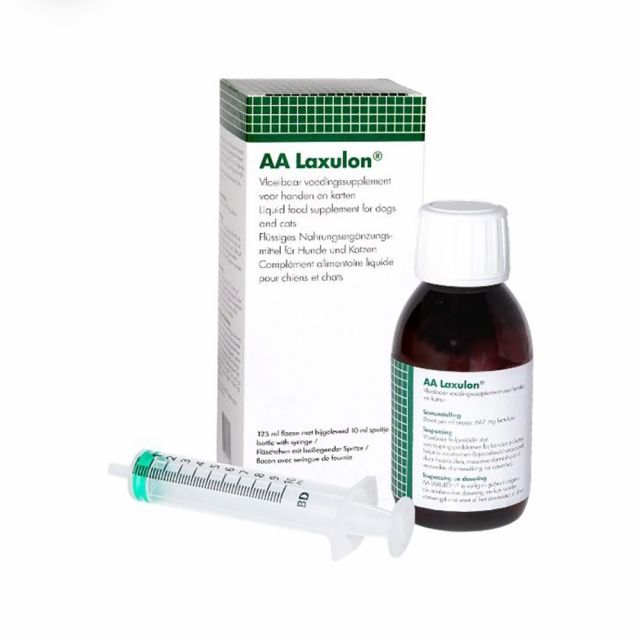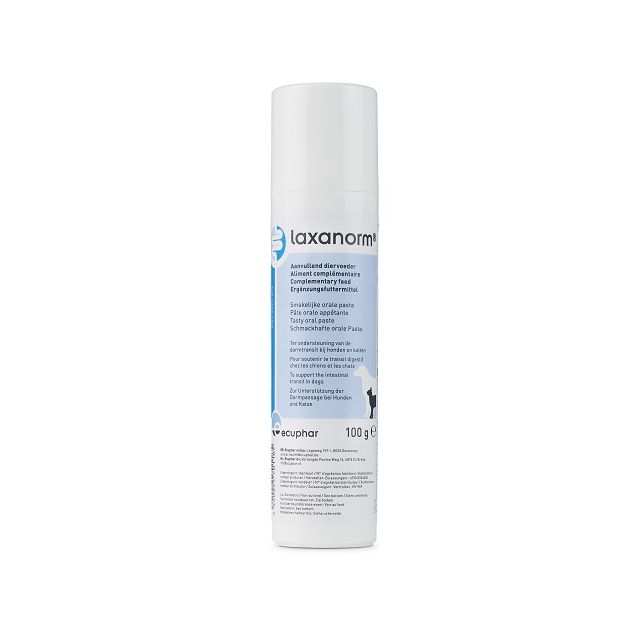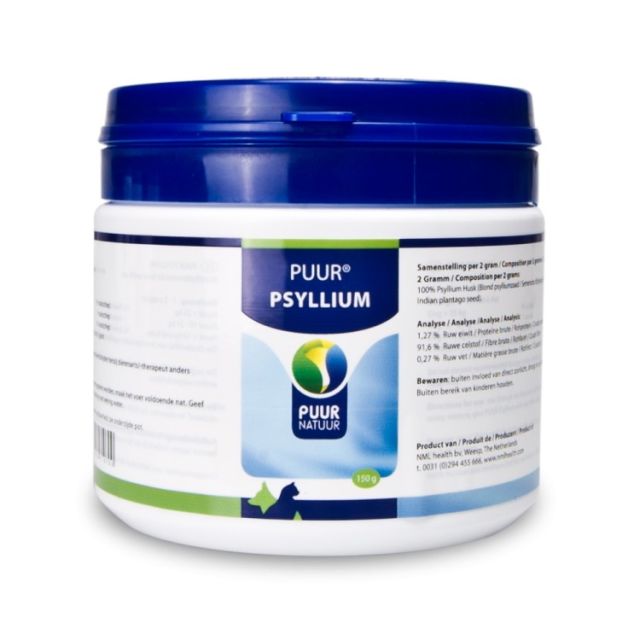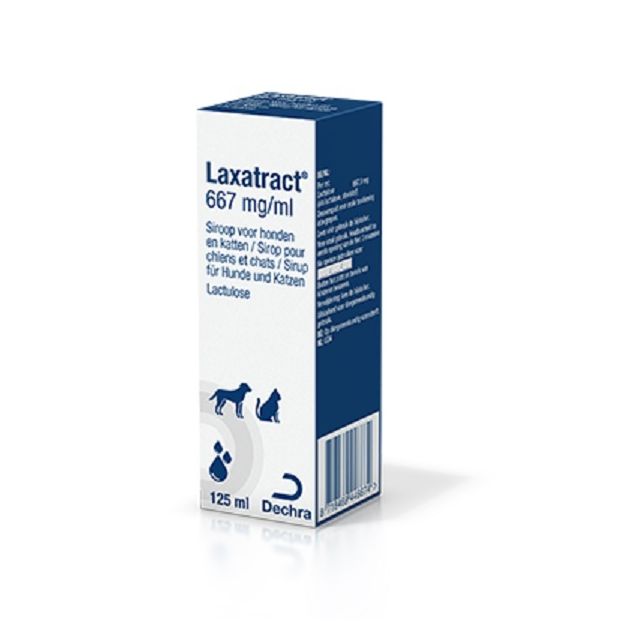Constipation in the dog
Straining for a very long time without any bowel movement or with only small, hard pellets as a result; constipation, also known as blockage, is an unpleasant problem for all dogs. Not being able to defecate is painful and should be resolved quickly. If your dog has a blockage, it is important to consult a veterinarian.
It is essential to know the causes and symptoms so that you can intervene early. Preventing constipation is even better. Pharmacy4pets is happy to advise you on nutrition and supplements that can help soften your dog's stool.
Symptoms of Constipation in Dogs
The primary symptom of a blockage is straining. Other symptoms include:
- Protrusion of the anus, sometimes with visible mucous.
- Swelling around or next to the anus.
- Less (frequent) defecation than usual.
- Small, hard pellets.
- Flattened stools.
- Pain during defecation.
- In severe or prolonged blockage: vomiting, loss of appetite, general illness.
Normal dog stool is firm and formed but shiny and moist, and it usually occurs regularly (usually 1 to 3 times a day, varies by dog). If the stool is thinner in consistency or different in odor or color, it is called diarrhea. Dry and hard stool that falls apart is abnormal and may indicate constipation.
Nutrition and Constipation
Constipation is often caused by nutritional errors: highly digestible food with insufficient dietary fiber can reduce the number of bowel movements and provide inadequate nutrition for beneficial gut bacteria (the gut flora or microbiome). Constipation can be a possible consequence. Eating too many bones can also lead to blockage: bone fragments can accumulate in the intestines. Constipation is relatively common in dogs that consume raw meat: this type of diet often contains very little fiber and sometimes too much bone.
The usual advice for constipation is a special high-fiber diet. You can also add loose fibers to your dog's diet. Psyllium fibers in Iso-Gel attract water, making them help soften the stool. Iso-Gel also stimulates bowel movements. Probiotics like Pro-Kolin Advanced and Canikur Pro help rebalance the gut flora.
Constipation can also result from inadequate hydration. Therefore, always ensure your dog has access to plenty of fresh drinking water.
Did you know:
Small dogs often have somewhat harder stool, and large dogs are more likely to have somewhat wetter stool? This is related to the length of the intestine and the composition of the gut flora. By providing food with an optimal fiber composition for your dog's type (or adding extra fiber), you can help maintain the consistency of their stool optimally.
Blockage Due to Intestinal Problems
Most dogs love to play. Some dogs don't stop at playing and enjoy destroying their toys. By eating things that shouldn't be eaten, such as (parts of) toys, but also chestnuts, socks, and cushion stuffing, the intestines can become blocked.
Narrowing of the intestines due to other reasons, such as scarring (after intestinal surgery or damage to the intestine from a sharp foreign object), a polyp, or intussusception (the telescoping of sections of the intestine, often seen in young dogs with diarrhea or after swallowing ribbon-like foreign objects), can also cause blockages.
Dogs with constipation due to the above reasons are often ill: they vomit, refuse to eat, and experience severe abdominal pain. Usually, surgery is required to resolve such blockages.
In (especially unneutered) older male dogs, an enlarged prostate can sometimes cause problems with defecation. The enlarged prostate can then press against the last part of the colon. Other symptoms may include difficulty urinating, blood loss from the penis, and flattened stools. Tumors or inflammations in the pelvis can also compress the intestines.
A weakening of the pelvic floor muscles often occurs in older male dogs. In a condition called 'hernia perinealis,' the dog's rear end bulges during straining. This condition is very painful and requires surgical correction.
Pain during Defecation
If your dog experiences pain during defecation, they will try to strain as little as possible. As a result, the stool may stay in the rectum for longer, dry out, and become harder. The problem will only worsen, and defecation will become increasingly painful. Examples of conditions that can cause pain during defecation include anal furunculosis (a highly painful condition that occurs in German Shepherds and is characterized by sores around the anus) and anal gland problems.
Relieving Constipation in Dogs
Depending on the cause and severity, there are various ways to resolve your dog's constipation. For mild cases of constipation, providing a high-fiber diet or adding extra fiber like Iso-Gel may be sufficient to soften the stool. However, a laxative such as Laxulon is often needed. If the stool is very bulky, a laxative administered through the mouth may be insufficient and not fast enough. In such cases, an enema or even removal of the stool under anesthesia may be necessary. Therefore, it is always advisable to consult your veterinarian if your dog cannot defecate!
Furthermore, the cause of the blockage largely determines the treatment of constipation. Specific medications and/or (chemical) castration are indicated for an enlarged prostate.
Anal gland problems need to be resolved by expressing the anal glands and, if necessary, additional medication such as antibiotics or procedures like flushing the anal glands.
In cases of blockages caused by a foreign object lodged in the intestine or a hernia perinealis, surgery is usually required. For dogs with a hernia perinealis (current or previous), it is important to keep the stool soft. Adding Iso-Gel to the diet can help with this.
Preventing Constipation (and Helping)
By providing your dog with a good, balanced, and fiber-rich diet and always ensuring an adequate supply of water, you can help maintain the quality of their stool optimally.
Additionally, monitor the stool closely. If you notice that the stool is becoming drier, harder, or smaller, or if it is consistently on the dry side, consult your veterinarian to discuss whether it may be wise to adjust the diet or add extra fiber like Iso-Gel.
If your dog has a sensitive stomach and/or intestines, support them with probiotics. Also, during or after an antibiotic treatment, the gut flora can benefit from a boost.
Be cautious with giving bones, and if your dog is a chewer, provide sturdy toys and do not let them play unsupervised. If you suspect that your dog has ingested something unintended, consult your veterinarian to determine if inducing vomiting is necessary to prevent an obstruction from the foreign object. Lastly, regularly inspect the anus and the surrounding area.
If you have any questions about our products or about constipation in your dog, please contact us.







